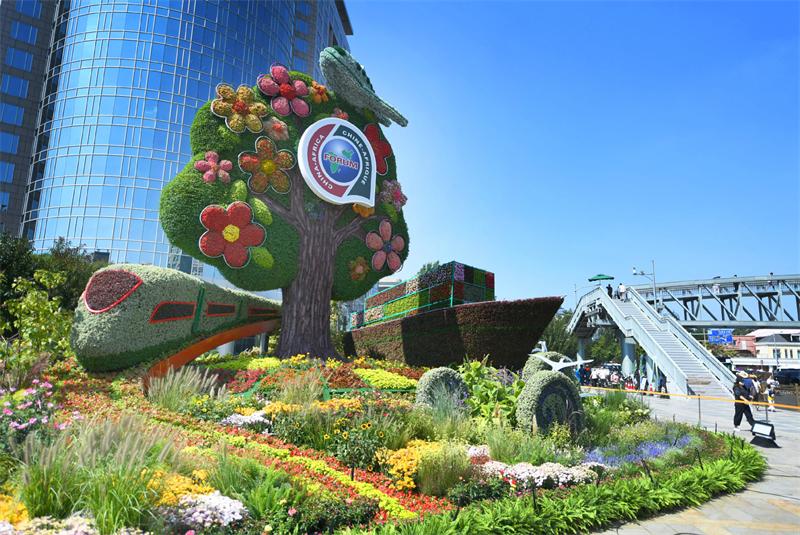
 0 Comment(s)
0 Comment(s) Print
Print E-mail Xinhua, September 4, 2024
E-mail Xinhua, September 4, 2024

A floral decoration marking the 2024 Summit of the Forum on China-Africa Cooperation (FOCAC) is pictured in Dongcheng District of Beijing, capital of China, Aug. 29, 2024. [Photo/Xinhua]
As the 2024 Summit of the Forum on China-Africa Cooperation (FOCAC) approaches, the fluttering flags of African nations in the streets of Beijing not only herald the reunion of old friends but also mark a new chapter in future cooperation.
Over the past half-century, the unity and cooperation between China, the world's largest developing country, and Africa, the continent with the largest number of developing countries, have continually delivered mutual benefits.
At its core, this partnership is built on mutual respect, shared aspirations, and a commitment to fostering a common future. In an era of global challenges, the China-Africa partnership offers valuable lessons for building a community with a shared future for mankind.
China's relationship with Africa has deep historical roots, grounded in solidarity and mutual support during Africa's liberation struggles. Today, it has evolved into a multi-faceted partnership encompassing trade, investment, infrastructure development, education, healthcare, and more.
One of the most visible examples is the Belt and Road Initiative, which has seen significant investments in African infrastructure, such as roads, railways, ports, and power plants. These projects are not just about physical infrastructure; they symbolize a bridge connecting two regions committed to shared prosperity.
"To get rich, build roads first." The popular Chinese proverb rings true in Africa. Drawing on its own development experience, China has been dedicated to working with Africa to build transport facilities crucial for economic development.
Over the last quarter century, Chinese companies have helped African countries build or upgrade more than 10,000 km of railways, nearly 100,000 km of highways, roughly 1,000 bridges, almost 100 ports and 66,000 km of power transmission and distribution lines, all of which have created arteries of connectivity across the African continent.
Beyond infrastructure, China is also working with Africa to drive the continent's green transition through investments in hydropower, wind, and solar energy, and addressing key challenges in agricultural technology and food security.
Over the past decade, China has set up 24 agricultural technology demonstration centers in Africa and popularized more than 300 advanced agricultural technologies, which have increased local crop yields by an average of 30 to 60 percent, benefiting more than 1 million farmers in African countries.
China and Africa's shared vision for the future is also reflected in their joint efforts in areas such as healthcare and education. The COVID-19 pandemic has underscored the importance of these efforts, as China provided substantial medical aid to African nations, including vaccines and healthcare equipment. Meanwhile, through scholarships, vocational training, and cultural exchange programs, China has contributed to the development of Africa's human capital.
These initiatives not only help foster mutual understanding but also equip young Africans with the skills needed to thrive in a rapidly changing world.
China's growing engagement with Africa unsettles some nations in the West. They hence use narratives like "neocolonialism" and "debt trap" as geopolitical tools to smear China and weaken the effectiveness of its development partnerships with developing countries.
However, the reality on the ground suggests a different story. African leaders have repeatedly emphasized that China's approach respects their sovereignty and development priorities. This stands in contrast to the paternalistic and conditional aid often provided by the West.
It is with a spirit of mutual respect and win-win cooperation that China and Africa are addressing global challenges such as climate change, peacekeeping, and sustainable development. African countries, which are among the most vulnerable to climate change, have found a partner in China that is committed to supporting green energy and sustainable development initiatives across the continent.
In a world still marred by power politics and hegemony, one can better appreciate the global significance of the China-Africa partnership that highlights equality, common development and shared benefits.
This partnership is not merely transactional; it represents a vision for a more just and equitable world order. Together, China and Africa can better champion international fairness, genuine multilateralism, and the causes of developing countries.